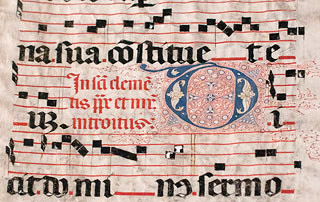
Detail of Folio 101, "St. Clement (Common of a Confessor not Bishop)," from the Glaser Codex manuscript at MIT. (Photo courtesy of Michael Cuthbert.)
Instructor(s)
Prof. Michael Scott Cuthbert
MIT Course Number
21M.220
As Taught In
Fall 2010
Level
Undergraduate
Course Description
Course Features
Course Highlights
A video of Lecture 16 illustrates the participatory style of this course. The session covers 16th-century vocal and instrumental music, from Martin Luther's Psalms to the early madrigal. It includes works by composers Johann Walter, Giovanni Palestrina, Michael Praetorius, and Thomas Weelkes, and an in-class demonstration of the chant Office of Sext (Feria Secunda ad Sextam).
Course Description
This course examines European music from the early Middle Ages until the end of the Renaissance. It includes a chronological survey and intensive study of three topics: chant and its development, music in Italy 1340-1420, and music in Elizabethan England. Instruction focuses on methods and pitfalls in studying music of the distant past. Students' papers, problem sets, and presentations explore lives, genres, and works in depth. Works are studied in facsimile of original notation, and from original manuscripts at MIT, where possible.


